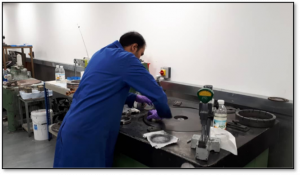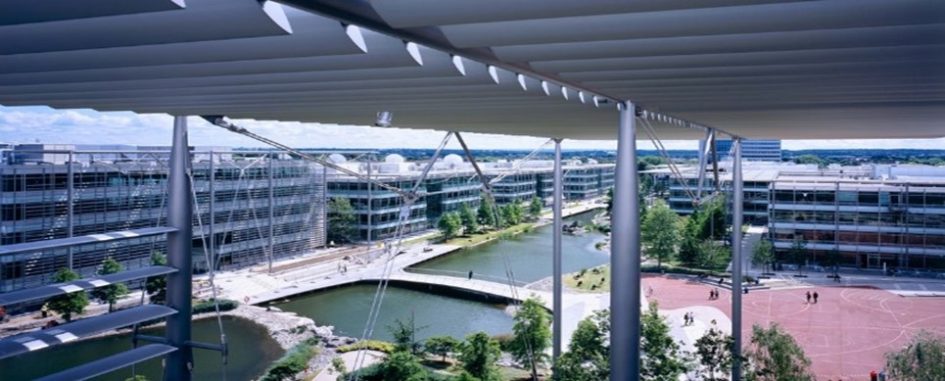This short case study by Ben Onyido, Placement Tutor in DMU’s faculty of Computing, Engineering and Media (CEM), explores how sustainability issues are being linked to student placements…
University placements are a prominent form of supervised work-based learning. They involve students working in industry as part of their academic courses, in order to gain early career experience and make connections between academic theory and industry practice. They play a significant role in preparing students for future employment.
The CEM Faculty runs standard (1-year) placements for undergraduates and postgraduates in the 3 schools (Computing, Engineering and Media), with start dates for individual students mostly spread across June to September. Over the last 3 years, the number of students going out on placements has averaged approximately 100 per year, with undergraduates making up the majority (about 82%).
The placement programme is mainly run as 3 separate modules. One of the modules, SAND 2901 for Computing and Media undergraduates, is credit-bearing. The other two, SAND 2802 (for Engineering undergraduates) and SAND 5801 (for all faculty postgraduates), are not. In addition, there are 2 other modules for short-term/summer placements, but most students go on standard/1-year placements.

A postgraduate placement student helped develop a more resource-efficient procedure for precision manufacturing at an instrumentation company.
Placements and sustainability
There is ever-increasing awareness that the environment and society are being adversely affected by human industrial activity, and that companies need to adopt more sustainable production and operational models. However, due to resource constraints, many companies – Small and Medium Enterprises (SMEs) in particular – may regard sustainability more as a burden than as a value-adding commercial strategy.
Meanwhile, there is societal expectation on universities to contribute towards assessing contemporary problems, including environmental and social issues. In this regard, there is scope for placements to have a dual-purpose of a traditional work experience scheme on the one hand, and a means of sustainability support for SMEs on the other.
Prior to going out on placements, students are equipped with analytical and sustainability learning, skills and orientation with which to act as sustainability champions within companies in addition to their regular internship roles. Emphasis is placed on a pragmatic form of sustainability that links it to a clear and bespoke business case for the company in question.
During their placements, students highlight the role that a company’s conventional practices (such as agile business processes) can actually play in enhancing its sustainability performance, and they also highlight the commercial benefits of environmental and social practices (such as energy and resource efficiency).

The placements take place in a wide variety of industries and in different locations, such as TV One UK and the Chiswick Business Park in London.
Actions taken and value provided
At CEM Faculty, students are being provided with dedicated tutor support before and during sustainability-themed placements.
- Pre-placement: In the three months prior to the commencement of placements, students can attend workshops that provide an orientation on both pragmatic sustainability and critical reflection. One-to-one tutoring sessions are also available to students who want support on sustainability and reflection beyond the workshops and any learning already gained from their respective courses. They are encouraged to perform a self-evaluation of technical and interpersonal skills relevant to the upcoming placement, and to set development goals.
- Intra-placement: Around the middle of each placement year, students attend refresher reflective and sustainability workshops. They also revise their development goals – by setting new ones or carrying over earlier ones – at the start of month 4 and again at the start of month 8. In addition, students produce reflective logbook entries on a monthly basis which capture student and employer perspectives on the placement. These are reviewed by placement tutors and feedback and support is given when needed.
The intended impacts of sustainability-themed placements lie in 3 areas:
- Observation: The student investigates the company’s environmental and social performance without actively trying to influence it, except as part of the student’s official duties.
- Advocacy: The student acts as a champion for sustainability within the company by promoting awareness, contributing towards proposals/plans, and/or conducting research or learning.
- Action: The student is directly involved in the implementation of sustainability measures and initiatives.
Students can focus mainly on any one of these areas during their placement. Regarding the value provided by these areas, observation (when supported by tutors with a research background) represents a means of knowledge generation for universities regarding sustainability in industry, which can complement a university’s standard research activities. It also enables the students to develop their skills in critical and systems thinking. Advocacy provides feedback to SMEs regarding the extent of their social and environmental impacts and how they can be more socio-environmentally responsible. Action directly contributes to efforts by SMEs to minimise their social and environmental footprints.
To optimise the effectiveness of the placement programme, a circular approach is applied whereby the information obtained via observation is used by the faculty to prepare the sustainability workshop sessions for the next placement year. The information should also be integrated into taught course modules as much as possible. The next cohort of placements students would thus be better enabled to go into companies with a better starting understanding of realities surrounding the long-term implementation of sustainability.
Future steps
Currently, the sustainability aspect of the placement programme at CEM Faculty is treated as an informal, elective ‘sub-module’. Going forward, we intend to make the sustainability element more formally recognised and visible within the various placement modules from the outset.
Final thoughts
There is scope for more joined-up working between taught courses and the non-taught placement programme in order to make students’ academic learning more readily applicable to placements and the rest of their career.

Leave a Reply